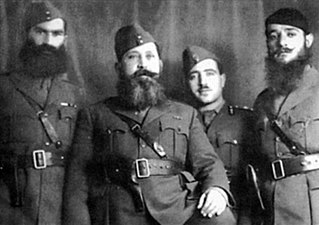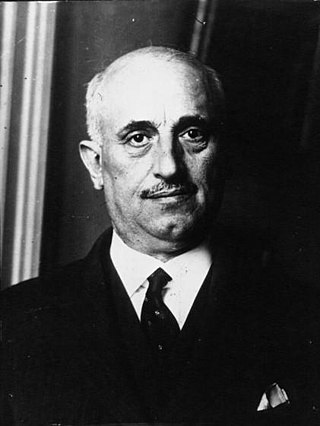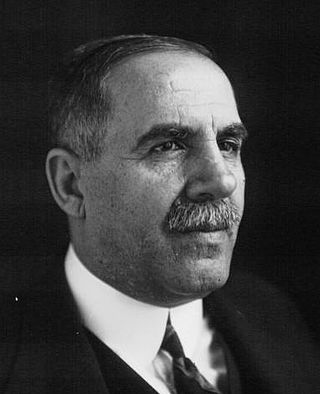Contents
| |||||
| Decades: | |||||
|---|---|---|---|---|---|
| See also: | Other events of 1932 List of years in Greece | ||||
| |||||
| Decades: | |||||
|---|---|---|---|---|---|
| See also: | Other events of 1932 List of years in Greece | ||||
The Liberal Party was a major political party in Greece during the early-to-mid 20th century. It was founded in August 1910 by Eleftherios Venizelos and went on to dominate Greek politics for a considerable number of years until its decline following the Second World War. Among its most well-known members, apart from Venizelos, were Alexandros Papanastasiou, Nikolaos Plastiras, Georgios Papandreou and Konstantinos Mitsotakis.
Parliamentary elections were held in Greece on 11 December [O.S. 28 November] 1910, following elections in August. The Liberal Party won 307 of the 362 seats. Eleftherios Venizelos remained Prime Minister, having assumed office on 18 October.
Parliamentary elections were held in Greece on 13 June [O.S. 31 May] 1915. The result was a landslide victory for Eleftherios Venizelos and his Liberal Party, which won 187 of the 316 seats in Parliament. Venizelos claimed that his victory was proof that the Greek people approved of his policy, favoring the Allies of World War I.

Parliamentary elections were held in Greece on Sunday, 14 November 1920, or 1 November 1920 old style. They were possibly the most crucial elections in the modern history of Greece, influencing not only the few years afterwards, including the Greek defeat by Kemal Atatürk's reformed Turkish Land Forces in 1922, but setting the stage for Greece's political landscape for most of the rest of the 20th century. It had been nearly five years since the last elections, a period during which all democratic procedures were suspended due to the National Schism, when Prime Minister Eleftherios Venizelos announced that elections would take place on 25 October. However, after the unexpected death of King Alexander, who had assumed the throne after the exile of his father, King Constantine I, the elections were postponed until 14 November.
Parliamentary elections were held in Greece on 19 August 1928. The result was a victory for the Liberal Party, which won 178 of the 250 seats.
Parliamentary elections were held in Greece on 25 September 1932. All 250 seats in the Lower House of the Greek Parliament, the Chamber of Deputies, were elected, as well as one-third of the seats in the Senate. The outcome was an ambivalent result for the two biggest parties, the Liberal Party of Eleftherios Venizelos and the People's Party. The People's Party received a plurality of votes in the Chamber of Deputies elections, but won fewer seats than the Liberal Party. The Liberals also won the most seats in the Senate.
Parliamentary elections were held in Greece on 5 March 1933. The pro-monarchist People's Party emerged as the largest party, winning 118 of the 248 seats in Parliament, ending the predominance of Eleftherios Venizelos' Liberal Party. The results triggered an attempted coup by Venizelist officers. A military emergency government under Alexandros Othonaios was instituted which suppressed the revolt, and was succeeded by a People's Party cabinet under Panagis Tsaldaris on 10 March.

Parliamentary elections were held in Greece on 31 March 1946. The result was a victory for the United Alignment of Nationalists, an alliance that included the People's Party, the National Liberal Party, and the Reform Party, which won 206 of the 354 seats in Parliament. As a result, Konstantinos Tsaldaris became Prime Minister leading a right-wing coalition. Nonetheless, he soon decided to resign in favor of Themistoklis Sophoulis, who led a government of national unity during the entire second phase of the civil war (1946–1949). One of the priorities of the new government was the proclamation of a plebiscite for the restoration of the Greek monarchy.
Parliamentary elections were held in Greece on 19 February 1956. The result was a victory for Konstantinos Karamanlis and his National Radical Union (ERE) by securing the electoral vote despite trailing in the popular vote, due to gerrymandering employed by ERE. It was the first general election in Greece in which women had the right to vote although women had first voted in a by-election in Thessaloniki Prefecture in 1953 in which the first female MP was elected.
A referendum on becoming a republic was held in Greece on 13 April 1924. It followed the catastrophic outcome of the Asia Minor Campaign. As a result of the military defeat, King Constantine I was forced to abdicate in favor of his son, King George II. King George himself later went into exile in the Kingdom of Romania, the home of his wife Elisabeth of Romania, while the government debated the fate of the monarchy. Ultimately, a plebiscite was called. This referendum, following the restoration of Constantine I in 1920, reflected the see-saw nature of the Greek electorate and the then-present dominance of the Liberal and Republican Venizelists in Greek politics and abolished the Crown.
Senate elections were held in Greece on 21 April 1929. The Senate was a new institution introduced with the Greek Constitution of 1927 and these were the first elections for it. The result was a victory for the Liberal Party, which won 64 of the 92 directly-elected seats. It was regarded as a public approval of the policies of Prime Minister Eleftherios Venizelos.

Panagis Tsaldaris was a Greek politician who served as Prime Minister of Greece twice. He was a revered conservative politician and leader for many years (1922–1936) of the conservative People's Party in the period before World War II. He was the husband of Lina Tsaldari, a Greek suffragist, member of Parliament, and the Minister for Social Welfare.

Alexandros Papanastasiou was a Greek lawyer, sociologist and politician who served twice as the Prime Minister of Greece during the interwar period. He was a pioneer in the establishment of the Second Hellenic Republic.

The Second Hellenic Republic is a modern historiographical term used to refer to the Greek state during a period of republican governance between 1924 and 1935. To its contemporaries it was known officially as the Hellenic Republic or more commonly as Greece. It occupied virtually the coterminous territory of modern Greece and bordered Albania, Yugoslavia, Bulgaria, Turkey and the Italian Aegean Islands. The term Second Republic is used to differentiate it from the First and Third republics.

The National Progressive Centre Union was a Greek Venizelist political party. It was founded in 1950 by Nikolaos Plastiras, and formed a government with other Centrist parties after the 1950 legislative election. It later formed another coalition government after the resignation of Sofoklis Venizelos as Prime Minister, and another one in 1951 with Venizelos. After Plastiras's death in 1953, the party continued to exist, but was subsumed into the Centre Union in 1961.

Georgios Kafantaris was a Greek politician, a political personality of the first half of the 20th century and a prominent member of the Venizelist party.
Parliamentary elections were held in Greece on 21 August [O.S. 8 August] 1910. Eleftherios Venizelos had begun to dominate the political life of the country. He was listed as a candidate by his followers and was elected with the most votes at the Attica-Boeotia constituency. The United Parties won 211 of the 362 seats. Stefanos Dragoumis remained prime minister until his resignation on 18 October [O.S. 6 October] 1910, when Venizelos became prime minister. Because Venizelos did not have the confidence of Parliament, he agreed with King George to dissolve parliament. Fresh elections were held in November.
Parliamentary elections were held in Greece on 24 March [O.S. 11 March] 1912. The Liberal Party won 146 of the 181 seats. Eleftherios Venizelos remained Prime Minister, having assumed office on 18 October 1910.
The Conservative Democratic Party was a political party in Greece in the 1920s and 1930s led by Andreas Michalakopoulos. The party was created in 1924 after Michalakopoulos split from the Liberal Party. It represented the conservative wing of the Liberals, in contrast to Alexandros Papanastasiou's Democratic Union, which represented the progressive wing.

The cabinet of Alexandros Papanastasiou was the first government of the Second Hellenic Republic.